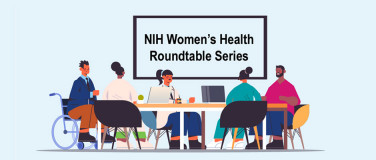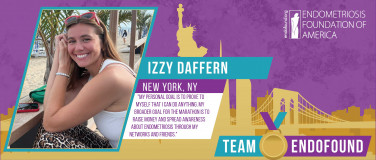
Several college students and campus organizations contacted EndoFound this year about bringing endometriosis educational and fundraising events to their schools. EndoFound has responded by creating the ENPOWR College Ambassador Program, which will kick off this semester at more than two dozen colleges and universities.
“I’m excited to see so much interest in something that’s very personal to these students,” said Carolyn Mayer, EndoFound’s program director. “We’re looking forward to taking a lot of direction from them and seeing how this first cohort goes.”
ENPOWR—ENdometriosis: Promoting Outreach and Wide Recognition—was started by EndoFound in 2013. The initiative provides endometriosis and menstrual health education and resources for middle and high school adolescents. The College Ambassador Program adds another layer to that effort for a disease that inflicts an estimated one in 10 women in the U.S. and takes an average of about a decade to diagnose.
Thirty students from 28 schools applied to be ambassadors by submitting a resume and letter explaining their interest in the program. Applicants are from schools as small as Chippewa Valley Technical College in Wisconsin and Reed College in Oregon, and from as large as Ohio State University and Boston College.
All the candidates are passionate about women’s health, and many have endometriosis. One wrote in her application that she’s returning to school this semester after taking two years off due to the severity of her endometriosis symptoms. Another had endometriosis surgery last year after bouncing from doctor to doctor for 10 years without a diagnosis. A third student said she’s been discriminated against at her male-dominated military college for having the disease and wants to support other female cadets with endometriosis or other health issues.
EndoFound will choose any number of the 30 applicants in the coming week based on “a demonstrated commitment to endometriosis and menstrual health.” Ambassadors will be required to plan at least one educational event per semester, such as a presentation to a campus group, distributing endometriosis educational materials at a campus event, or fundraising. The hope is that ambassadors will cause an educational ripple effect by creating partnerships with athletic teams, student organizations, academic departments, sororities, and fraternities.
EndoFound will supply ambassadors with a 24-page handbook explicitly designed for the program, along with branded tablecloths, stickers, pamphlets, and posters. Each ambassador will check in with EndoFound monthly to brainstorm, troubleshoot, and ask for any extra support they may need. Ambassadors will also be part of a messaging group with one another so they can share ideas.
Mayer developed the program this summer with Tilly Morris, an EndoFound intern and senior at Colgate University in Hamilton, NY. Morris doesn’t have the disease but is majoring in biology and minoring in public health.
“I had a lot of fun working on it. As a college student, I think I have good insight into what programs students would be excited about and what would work in a campus setting,” Morris said. “This program will be a good way for students to get involved, and it will also empower them to take that knowledge of endometriosis wherever they go after college and create more awareness.”
How big the College Ambassador Program becomes remains to be seen, but the possibilities appear endless.
“In the future, as long as there is a volunteer interested in bringing endometriosis education and awareness to a campus, we’d love to support them,” Mayer said. “We’re hoping with this first group to learn a lot on how to improve our dissemination of materials, our program planning, and how we reach campuses. The need is ubiquitous, so we’d love for this to be as far-reaching as possible.”
To learn more about ENPOWR (and the College Ambassador Program as it develops), visit www.endofound.org/enpowr.









